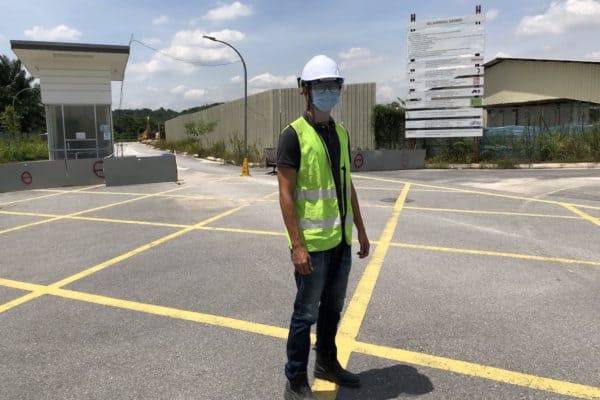Project Engineer vs Project Manager: Salary, Stress & Skills
Project engineers and project managers seem to do the same thing. Hence, many people are asking what is the differences between a project engineer and a project manager. So, I decided to share my experience.
After I graduate from college, I went to become a project engineer working in the ACMV (air conditioning and mechanical ventilation) industry. After 5 years, I become a project manager. So, I got a pretty good idea of what it is like being a project engineer versus a project manager.
1. Project managers have a higher salary
Project managers have a higher basic salary than project engineers. A young project manager can earn a basic salary of around RM 5000 while a project engineer only earns around RM 2500.
To know more about project engineer salary (Malaysia), check out this post.
A project manager often starts off by being a project engineer first. Hence, project managers usually have more working experience and thus, their basic salary is mostly higher than project engineers.
Most of the time, you can’t be a project manager if you are a fresh graduate. The youngest project manager that I’ve seen is 27 years old. Meanwhile, many project engineers are around 25 years old.
Furthermore, project engineers often have a much lower basic salary because they are compensated further with travel and site allowances. Besides, they also have phone and meal allowances.
2. Project managers get better job benefits
Project engineers are mostly site-based or semi-site-based. They are either full-time working on a construction site or they have to go to their assigned sites 3-4 days per week.
On the other hand, many project managers are office-based. Sometimes, project managers are full-time based on the site depending on the type of company they are working in.
Main contractors usually have a project manager that is full-time on-site. Usually, they have senior project managers who are office-based and oversee their project managers.
So, project engineers typically have benefits such as travel allowances, site allowances, phone allowances and meal allowances. Some project engineers can claim toll and parking fees as well as have a free laptop and a set of personal protective equipment (PPE).
Unlike project engineers, project managers don’t stay at the construction site and thus, they don’t have travel and site allowances. However, they can claim phone, toll and parking expenses.
Furthermore, project managers often have entertainment budgets for karaokes, alcohol drinks and spas with clients. Moreover, they can claim flight tickets and hotels if they are traveling for business purposes.
Nowadays, many project managers (especially senior project managers) have a company car. Car expenses on services, maintenances and repairs are all paid by the company they are working in.
3. Project engineers have less responsible
Since project engineers are managing their construction projects, they technically are project managers too right? Many people thought that the responsibility of project engineers and project managers overlap but it is not quite true.
In small companies, the work is not much. So, small companies don’t hire project managers to run projects. Instead, they hire project engineers to run the entire project. If a small company hires a project manager to run projects, the project manager is essentially doing the same job as a project engineer but demands a higher pay.
Although the responsibility of project engineers are widely depending on the company they are working in, they generally are responsible for the following task:
- Material submissions and approvals
- Method statement submissions and approvals
- Shop drawing submissions and approvals
- Site walks and inspections
- Issuance of request for informations (RFIs)
- Manpower arrangement at site
- Attend site meetings
- Testing and commissioning
Project engineers are responsible for site-related work. They are steered towards site work execution rather than managerial and cost-related work.
On the other hand, project managers are responsible for the following task:
- Project profit and loss
- Resource management
- Project scheduling
- Progress claim and variation orders
- Project specifications
- Stakeholders management
- Project cashflow management
- Legal and contractual matters
Project managers are responsible for business-related work. They often need to meet clients for outstanding payments and prepare letters when legal issues arise.
4. Project engineers & project managers are equally stressful
Although a project engineer and a project manager may work on the same project, both have different things to worry about and stress with.
Because project engineers are working on site-related work, they are often stressed by site people such as clerk of works (COWs), M&E coordinators and managers from other trades working at the site.
If a project engineer is doing a good job, he/she rarely gets pressure from the office. Instead, most of the stress are external and site-related.
On the other hand, project managers can get serious stress from their own bosses. Project managers are responsible for the profit and loss of projects. Hence, they are often reporting directly back to the directors of the company they are working in.
While project engineers have direct stress, project managers usually have “invisible stress”. Many things handled by project managers are not known to other people including their bosses and directors. Hence, people often have a hard time understanding what a project manager is stressing with.
If a project manager chooses to reduce the stress level by slacking and not paying much attention to solving the underlying issues, the consequences are most devastating.
Therefore, project managers may not have many things to stress with but the intensity of their stress is much higher than the stress experienced by project engineers.
5. Project engineers & project managers are equally risky
You might think that project engineers are working at construction sites and therefore, they must have a higher risk level than project managers. Well, it is not entirely true.
Higher stress levels can be considered as higher risk levels because stress affects a person’s health. Furthermore, stress are not visible and hence, people often not paying enough attention to overcome their stress.
Being a project engineer may be physically riskier by having to work at construction sites where things can fall on your head or you might accidentally fall from a height and get injured.
But, being a project manager requires you to live in a constant high-stress condition. Sometimes, you’ll need to join entertainment alcohol sessions which you may drink too much over time and cause serious health issues.
Hence, being a project manager may not have a lower risk level than being a project engineer. Stress often is a silent killer.
Nevertheless, insurance companies may evaluate a project engineer as a high risk level individual than a project manager if the project manager is office-based.
6. Project managers often have better technical skills
Project engineers are dealing with technical problems on a daily basis while project managers are mostly dealing with management issues. However, it doesn’t mean that project managers don’t have good technical skills.
Most project managers have better technical skills than project engineers in general. They have more working experience and thus, they naturally have more chances to work with technical problems than project engineers.
However, when it comes to detail technical problems, project engineers often have high precision and practical solutions than project managers. In addition, many project managers gradually derailed from technical problems, causing their technical skills to deteriorate over time.
Find out the 9 skills that make a project engineer good.
Nevertheless, I still see most project managers have better technical skills than project engineers. But, senior project engineers can have better technical skills than long-term office-based project managers.
7. Project engineers don’t have excellent soft skills
Project managers are known to have excellent soft skills because they rely on soft skills when dealing with complaining clients and payment-dragging clients. They naturally develop strong soft skills in order to stay in the position.
On the other hand, project engineers also develop soft skills over time at the site, dealing with foreign workers, arrogant people and complaining coordinators. However, buying them a coffee or two usually ease up their emotion and resolve bad relationships.
As for project managers, they are dealing with high authority people. Buying tough clients a coffee won’t do the job. Hence, they need to talk “grandpa story” and consistently manage their client’s emotions in order to be successful.
Therefore, most project managers have much better soft skills than project engineers. Even senior project engineers have a hard time catching up with project managers.
8. Project managers often need to entertain clients
Because project engineers are always at the construction site, their work friends are mostly people from the same construction site. They can be suppliers, consulting engineers and project engineers of other trades.
Project engineers are usually hanging around in “mamak” and average restaurants. Their gathering is mostly on a budget since most people on the construction site are not earning a very high salary.
As for project managers, their work lifestyle can be very different from project engineers. Project managers are constantly invited for lunch or dinner sessions by suppliers and subcontractors.
In addition, some project managers have to spend their entertainment budget on important clients and thus, many of their meals are either treated by other companies or the company they are working in.
In terms of working, project managers are friends with consulting directors, project managers from other trades and a few clients or client’s assistants. Most of them are office-based too.
However, depending on the type of company, some project managers have a similar work lifestyle as project engineers. But, if they are full-time on-site, they often hanging around with consultants and architects who are high authority people at the site as well.
9. Project engineers have more opportunities in career development
Project engineers are mostly at the early stage of their career. Though some project managers are young and thus, at early stage of their career, most project managers are either at the middle or late stage of their career.
The career path of a project engineer is typically as below:
Fresh graduate > project engineer > senior project engineer > assistant project manager > project manager > senior project manager
See more about project engineer career path.
I have a few friends who are project managers and senior project managers. Some project managers are as young as 28 years old while some senior project managers are as young as 37 years old. But, senior project managers are still maintaining at the same position after 5 years.
Being a project engineer, you’ll have more room to develop and get promoted to a higher position. On the other hand, project managers usually switch from one company to another company without changing their position.
Most project managers get their senior title when reaching 40 years old. Afterward, they remain at the position until retire. However, in large companies, a senior project manager can be promoted to become a project director.
If you are a project engineer or you want to become a project engineer, I encourage you to check out my Project Engineer Starter Pack. It’ll give you the tools that you need to start strong as a project engineer.
If you have anything to add (or ask) about this topic, leave a comment down below!









